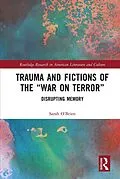This book explores the ways in which transnational fiction in the post-9/11 era can intervene in discourse surrounding the "war on terror" to advocate for marginalised perspectives. Trauma and Fictions of the "War on Terror" conceptualises global political discourse about the "war on terror" as incongruous, with transnational memory frames instituted in Western nations centralising 9/11 as uniquely traumatic, excluding the historical and present-day experiences of Afghans under Western-specifically American-hegemonic violence. Recent developments in trauma studies explain how dominant Western trauma theory participates in this exclusion, failing to account for the ongoing suffering common to non-Western, colonial, and postcolonial contexts. O'Brien explores how Khaled Hosseini (The Kite Runner), Nadeem Aslam (The Wasted Vigil, The Blind Man's Garden), and Kamila Shamsie (Burnt Shadows) represent marginalised perspectives in the context of the "war on terror".
Autorentext
Sarah O'Brien (PhD) completed her doctoral work at Maynooth University, Ireland, in 2019. Her research areas relate to trauma, memory, south Asian fictions of the "war on terror," and postcolonial and world literatures more broadly.
Inhalt
Introduction
Chapter One: Translating Trauma in Khaled Hosseini's The Kite Runner
Chapter Two: Shared Graves: Empire and Trauma in Nadeem Aslam's The Wasted Vigil
Chapter Three: Haunted Communities: Tracing the Ghosts of the 'war on terror' in Nadeem Aslam's The Blind Man's Garden
Chapter Four: Spectres of Empire in Kamila Shamsie's Burnt Shadows
Conclusion
